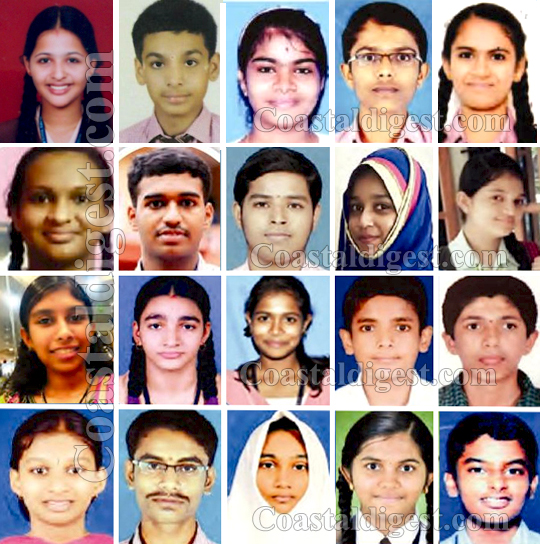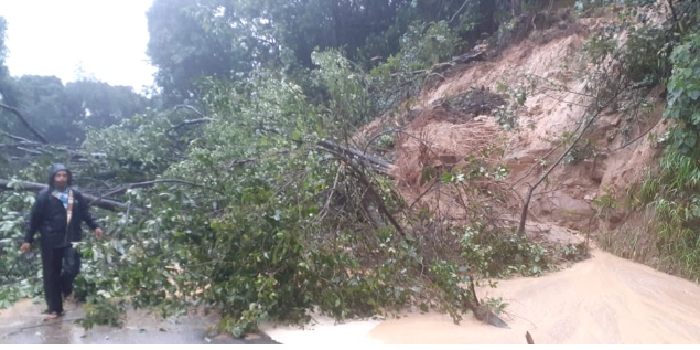Mangaluru, May 17: The Karnataka SSLC results-2016 brought with them much reason for good cheer as a large number of students in Dakshina Kannada and Udupi districts scored above 610 marks. Coincidentally, most of the top scorers from the twin coastal district hail from a humble background.
(from top left) Bindya Shetty(620), Sushruth (624), Rakhi Shet (609), Lakshmikant (617), Supreetha (618), Ramya Shree (623), Aditya (623), Chinmay (619), Renisha (615), Riya Jeshma (608), Sanjana (622) Meghana (622), Shilpa (621), Vivek Pai (622), Venkatesh (622), Deepthi (617), Chennaveeresh (617), Faaiza (610), Chaitra (622), Sohan (622).
Dakshina Kannada district topper Sushruth UK (624/625), a student of St Mary's English Medium High School, Laila, in Belthangady, has already started preparations for his further studies. Either entering the field of medicine or becoming an IAS officer was his dream since his childhood. Read more about Sushruth: Village boy who scored 624/625 in SSLC gives all credit to mom.
Aditya Kamath of Subrahmanya Kumaraswamy School has scored 623/625. He said he had expected to score 620 marks, and was surprised to see his marks as expected. “I used to study daily. My parents and teachers played a vital role in my success. I want to become a doctor or a scientist,” said Aditya.
Ajay KP of Canara High School (Main) in Mangaluru has secured 622 marks. He reads English literature and general knowledge books. He also likes to play shuttle. He wants to become an IAS officer after completing MBBS. He is the son of Shaila K N, lecturer at Balmatta First Grade College.
For Meghana Pai, a student of SVS English Medium School from Bantwal, 622/625 was a pleasant surprise as she had expected only 610. Daughter of G Krsihnanada Pai and Nandita Pai, the 16-year-old girl is all set to enter commerce stream as her dream is to become a successful Chartered Accountant.
Bindya Shetty, another topper from the district, has scored 620/625 marks. She is the student of Sri Mahalingeshwara English Medium School, Surathkal. “I was serious in my studies from Day One of my 10th standard. I did not leave my extra-curricular activities especially Bharathanatyam and Yakshagana, which helped me relax my mind and concentrate on my studies,” said Bindya and added, “I will take up Commerce in PU and will decide on my career later.” She is the daughter of Leeladhar Shetty and Sujatha Shetty.
Toppers in Udupi
In Udupi's Kundapur taluk three students have secured 622 out of 625. None of them went for coaching classes but did self-study.
Venkatesh Puranik B., a student of Government High School, Basrur, said that he had expected only 620 marks. But he was overjoyed to get 622 marks. “But my parents had expected me to do even better,” he said.
Son of Subrahmanya Puranik, a priest, and Annapurna Puranik, a homemaker, the boy used to study about four hours a day. “My aim is to become a Chartered Accountant. I have still not decided which college I should join for pre-university course,” he said.
U Chaitra Shanbhog, a student of S.V. English Medium High School, Gangolli, said that she had not expected to get 622 out of 625. It was a surprise for her. “My aim is to study Astronomy and become a space scientist,” she said.
Chaitra, daughter of U. Ravindra Shanbhog, an accountant at Gangolli Tiles Factory, and U. Geetha Shanbhog, a teacher at Sanjay Gandhi High School at Ampar, is learning Hindustani classical vocal. She loves playing shuttle badminton and ball badminton. In fact, she represented her school in shuttle badminton tournament.
H. Vivek Giridhar Pai, a student of V.K.R. Acharya Memorial English Medium School, Kundapur, said that he was delighted over getting 622 out of 625 marks. His aim was to do MBBS and become a paediatrician, he said.
Vivek Pai, son of Giridhar Pai, officer in Karnataka Road Transport Corporation (KSRTC), and Gayatri Pai, Head of the Department of Botany in Bhandarkars College, Kundapur, said that he used to study for three-four hours a day. He has already taken admission at S.R. College in Hebri for pre-university course.
Also Read :
Karnataka SSLC results out: girls outshine boys, Bengaluru Rural on top
Udupi loses top slot in SSLC; DK jumps to 3rd place despite fall in percentage
SSLC toppers: Ranjan scores 625/625, many others score 624, 623...
Mangaluru: Village boy who scored 624/625 in SSLC gives all credit to mom
No tuitions, no guides; Ranjan's 625/625 SSLC score mesmerises all







Comments
all the best everyone, do something for our country rather to be a part of foreign..
Add new comment